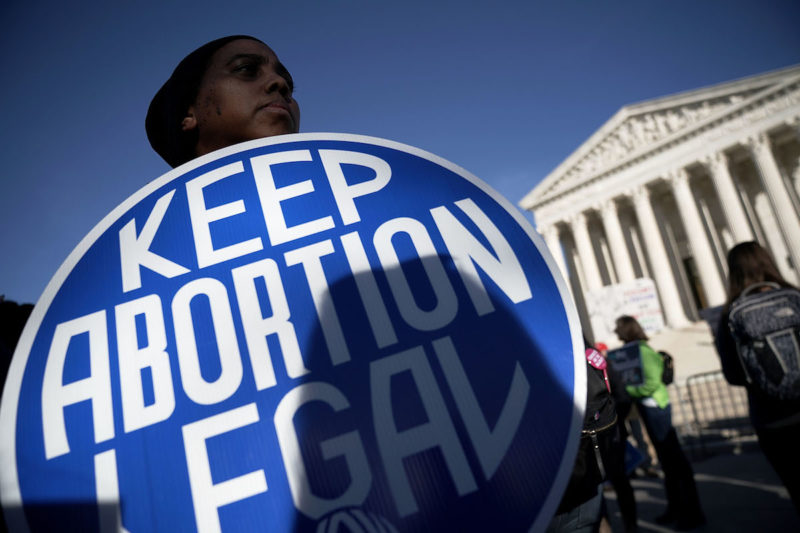Violent, Extreme Views on Abortion Don’t Deserve a Platform
Shame on the Washington Post for giving space to Kevin Williamson's deeply flawed views. There is nothing redeemable in recycling old, sexist ideas that ignore the realities of what it means to be pregnant in this country.

We hoped we had heard the last of Kevin Williamson after he lost a job at the Atlantic for saying that women who have abortions should be hanged. Unfortunately, he has found another platform: the op-ed pages of the Washington Post, where he ruminated recently on the question of “what should be done” with people who have abortions. He concludes that the best solution would be to punish women, doctors, and anyone who supports a woman in getting an abortion with sanctions, including jail time.
By taking capital punishment off the table (maybe) and pointing to France as the model, Williamson hopes to persuade us he’s not the arch-villain from the newest season of the Handmaid’s Tale. We’re not convinced. France, he says, isn’t a dystopian wasteland after all, so a little punishment for U.S. women couldn’t hurt.
His premise is deeply flawed. There are many notable social, historic, and economic differences between the two countries that Williamson fails to grapple with in his piece. In France, as he notes, the state provides full coverage for abortion care up to 12 weeks. But in the United States, barriers to abortion access force people to delay abortion care from early on in pregnancy, seek self-managed ways of ending their pregnancies, or give birth against their will. Williamson ignores the fact that bans on insurance coverage for abortion in Medicaid force 1 in 4 poor women seeking abortion to carry an unwanted pregnancy to term. The other 3 in 4 are often forced to delay care or forgo rent or groceries just to afford an abortion.
Williamson ignores these realities and ignores the experiences of those who have actually had abortions. As reproductive justice advocates who have worked to improve health care access in conservative states, we know better. As a volunteer at Planned Parenthood in Pennsylvania, Kelsey accompanied many women before, during, and after their abortion procedures, providing emotional support and a non-judgmental ear.
The first question Kelsey asks a patient is, “What are you feeling?” One day, a woman responded, “I’m a little nervous. There were so many protesters outside.” Indeed, anti-abortion protesters bully patients as they try to enter a clinic, relying on shame-based narratives about motherhood and womanhood to coerce patients out of their decisions. Kelsey told her that no one should be judged for their personal decisions about abortion—only the patient can know what is best for herself and her family.
We’ve both heard many stories like this, and they remind us that no one should be made to feel ashamed for getting reproductive health care. It’s pretty horrifying to think what Williamson would say to a woman who was seeking an abortion. Criminalizing abortion takes the shame and blame of anti-abortion protesters to the extreme by threatening women with arrest or prison for ending a pregnancy. His beliefs are dangerous and have been taken seriously by many people in power.
Williamson, along with anti-abortion sidewalk bullies and other opponents of legal abortion care, may find it thrilling to imagine a world in which people are fined, jailed, or even executed for seeking or providing abortion care. But even if we take them at their word that their goal is to prevent abortion, it’s a bad plan. In general, evidence does not suggest that criminal sanctions actually prevent “crimes”—a category in which, let’s be clear, abortion should not be included.
We know from history and countries where abortion is outlawed today that the criminalization of abortion care does not stop people from having abortions. When abortion is stigmatized, unaffordable, criminalized, or regulated out of existence, a woman will do what she thinks is best for her circumstances when faced with a pregnancy. Some will find safe methods to end a pregnancy, and some may use methods that are dangerous or ineffective.
Williamson would turn local police into investigators of every pregnancy that doesn’t result in a live birth. It’s a horrifying prospect, and already a reality for some, particularly women of color. Since 1973 at least 20 people have been arrested—and some jailed—in connection with ending their own pregnancies, and others have been arrested for their pregnancy outcomes. We know their names: Purvi Patel, Bei Bei Shuai, Latice Fisher, Regina McKnight, and more.
Criminalization of pregnancy and pregnant women is even more horrifying when you consider that a woman forced to give birth in the United States does so in a country with a staggeringly high maternal death rate—and one that’s many times higher for Black women.
I guess we can be thankful that Williamson’s commitment to punishing people who have, or help facilitate, abortions extends no further than his desire to write articles on the internet. But we don’t need more platforms for men to air their fantasies about throwing women in jail for making our own decisions. What we need is better access to reproductive health care and an end to politicians interfering.
Shame on the Washington Post for giving space to Williamson’s violent and extreme views. There is nothing redeemable in recycling old, sexist ideas that ignore the realities of what it means to be pregnant in this country, and there is certainly no value in giving those ideas a platform.

